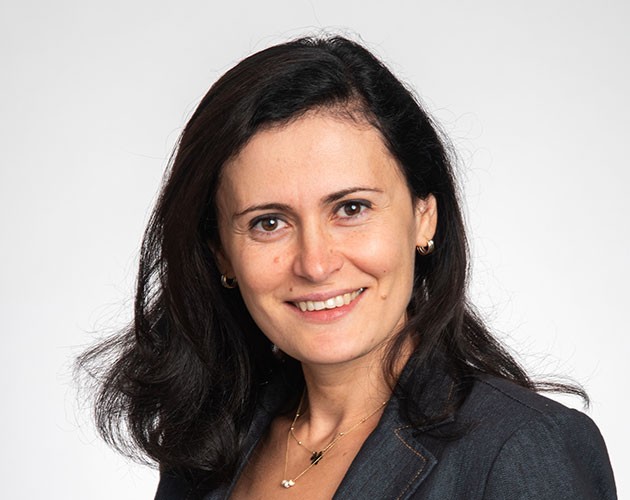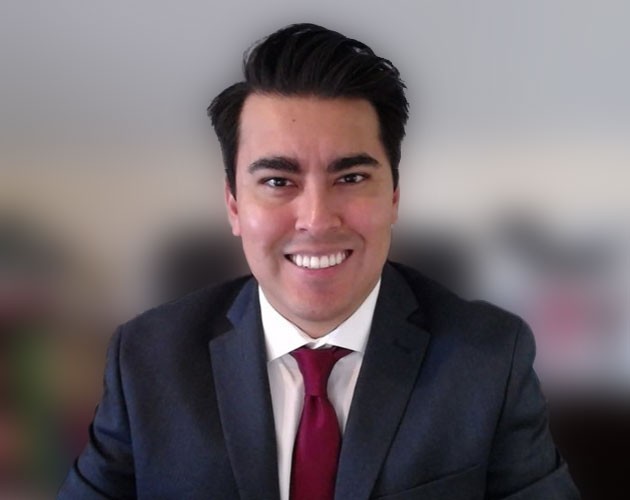Transitioning From Bench to Trial

The draw to studying molecular biology began as an undergraduate research student in the microbial biotechnology laboratory at Roma Tre University of Rome in Laura Castellini’s native Italy. From there, she started a graduate program working on defining molecular mechanisms regulating tumor angiogenesis at the Regina Elena National Cancer Institute. Meanwhile, she was awarded a one-year fellowship from the Italian Foundation for Cancer Research (FIRC-AIRC) to gain additional experience in oncology research before moving to the United States.
Laura continued her bench studies as a visiting scholar at Stanford University, identifying novel transcriptional targets of a tumor suppressor gene, and then went back to her native Italy to complete her graduate studies. During that time, she focused her research on food-borne zoonotic viruses at the Italian National Institute of Health.
Upon receiving her Ph.D., Laura returned to Stanford, first as a postdoctoral fellow and then as a research scientist. All told, we’re talking nearly 20 years of Laura honing her research studies in the oncology field.
But she wanted to see a wider, more patient-centric view of her efforts. Beyond studying cancer biology, she considered how her work would inform and ultimately drive the successful translation of new drugs into clinical application.
“When you work in basic science or early drug discovery,” Laura confirms, “you don't often see your programs evolving to first-in-human studies, as drug attrition rates are quite high during clinical development, often due to safety concerns, lack of efficacy or strategic decisions.”
To get that perspective, Laura moved into industry as a translational research scientist at Bristol Myers Squibb (BMS). Two years later, she moved up into a senior scientist role.
“The experience at BMS was an epiphany for my career!” Laura enthuses. “I witnessed discovery programs moving from inception to clinical development and learned how to outline translational and biomarker strategies from very talented and experienced professionals. But my desire to learn new skills did not stop there. I wanted to collaborate with study teams for clinical trial design and biomarker strategy, be accountable for monitoring trial progress and safety and prepare final reports for regulatory submissions.”
This certificate program was very interactive, with the opportunity of joining the community through class discussions, and giving and receiving feedback from the instructors and other classmates on a daily basis. Some weekly assignments were so intriguing that they would spark interesting debates with different viewpoint
And that’s when you turned to education—specifically our Certificate Program in Clinical Research Conduct and Management.
Yes, I was referred to this certificate by a couple of people: One is a UC Berkeley alumna and former Stanford colleague who is currently working as a senior clinical scientist and provided great feedback on this program, and the second is a BMS co-worker who also completed this certificate a few years back.
During this time, I had to leave the workforce and temporarily relocate to Italy. Nevertheless, I was able to enroll and begin this certificate program because it was also offered as a fully online format. I could be on another continent and still complete the courses at the pace I wanted. The weekly lectures and the additional training resources—learning videos, links to key federal websites providing information and guidance on regulatory aspects of clinical research—were carefully chosen and thoughtfully organized and presented. The curriculum comprised four required courses, each with weekly assignments and monthly tests, which allowed the students to move to the next course.
This certificate program was very interactive, with the opportunity of joining the community through class discussions, and giving and receiving feedback from the instructors and other classmates on a daily basis. Some weekly assignments were so intriguing that they would spark interesting debates with different viewpoints.
Each of the program's four courses was led by a different instructor, with all four instructors possessing diverse academic paths and professional experiences. I connected immediately with most of them, and particularly with the instructor of my first course, perhaps because we both come from Italy! He encouraged me to network with others, and offered practical ways to facilitate connections and conversations among peers, such as attending panel events with consulting companies.
I finished the certificate in less than a year and continued to interact with my instructors while looking for a new role and during the interview process. Their guidance and feedback were instrumental in helping me understand the optimal fit in the clinical research space, considering my prior experience and career aspirations. The instructors are really active and care about you; they’ll check in to see how the job search is going, help you add to your network and give you suggestions on how to approach a job interview.
The certificate gave me a solid foundation of the clinical trial phases and design, and clearly depicted roles and responsibilities of the many players in clinical research. Without the knowledge gained through this certificate, I wouldn’t have had such a smooth transition into my new job.
Congrats on successfully entering the field shortly after completing the certificate!
Thank you! I’m currently working at CCS Associates Inc., a CRO based in San José, Calif., that provides leading-edge scientific and strategic advisory services throughout the entire R&D process to government agencies, as well as the pharmaceutical, biotechnology and medical device industries.
This past year in my new role has been incredibly rewarding. I've been exposed to and actively participated in diverse projects, all of which came with a very steep learning curve. It's been a fantastic opportunity for growth.
The certificate gave me a solid foundation of the clinical trial phases and design, and clearly depicted roles and responsibilities of the many players in clinical research. Without the knowledge gained through this certificate, I wouldn’t have had such a smooth transition into my new job.
Having taken the classes, it’s easier for me to understand the applicable regulations, guidelines and compliance requirements for accurate and complete submission of regulatory documents—not to mention the ethical aspects and the project management elements required for a successful clinical trial planning, implementation and execution.
Currently, I’m a senior scientist working with both the preclinical R&D and the clinical/regulatory teams.
What does a typical week look like for you?
I’m accountable for drafting portions of agent-specific clinical documents, reviewing clinical protocols and amendments to ensure adherence to guidelines and regulations. I write sections of IND applications, IND annual reports and clinical manuscripts for peer-review submission. Part of my job is also to review adverse events coding and participate in query management to resolve discrepancies and ensure accuracy and completeness of clinical safety data.
I author due-diligence pieces for ad-hoc projects and review any information required for the preparation of a pre-IND package that is effective, informative and conducive to a productive meeting with FDA.
I very much enjoy my new role and I've been fortunate to work on projects encompassing various disease areas—primarily oncology and cancer prevention/interception, but also Alzheimer’s and Parkinson’s diseases—and different modalities, such as small molecule targeted therapies, immunotherapies and multiantigen DNA cancer vaccines.
Reach out to your instructors and ask questions; they have decades-long experience and can provide complementary information and guidance.
That’s fantastic! What advice would you give to someone who is looking to transition into a clinical research role?
Because clinical research includes a wide range of disciplines and research areas, my first piece of advice is to understand which role would be the best fit in consideration of prior experience and professional inclination. Secondly, I would encourage people registering for this program to take full advantage of the course material—diligently review slide decks and learning objectives, dive into the course additional resources and produce high-quality assignments.
At first it may seem daunting, but with a very disciplined approach and perseverance, you’ll get to the end of this program with the confidence of knowing the fundamentals of clinical research. In addition, reach out to your instructors and ask questions; they have decades-long experience and can provide complementary information and guidance.
I absolutely recommend this certificate, whether you’re looking for your first job, a career pivot or a role with broadened responsibilities. Good luck!


